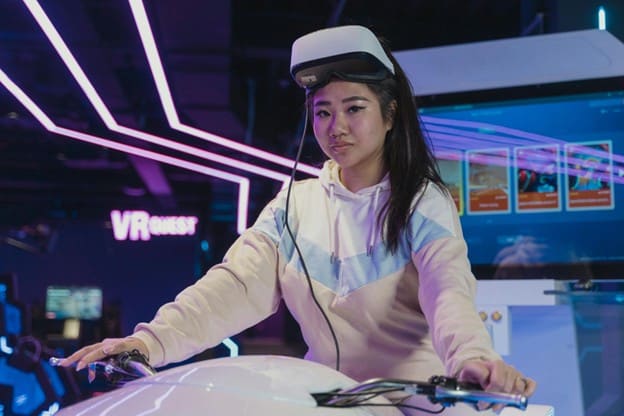Table of Contents
Urban life has always been synonymous with vibrant entertainment—from theaters and galleries to live music venues and buzzing nightlife. But in 2025, the digital transformation is redefining how city dwellers consume and experience entertainment. As new technologies continue to revolutionize industries, the entertainment sector in urban areas is undergoing one of its most dynamic shifts to date.
From immersive virtual experiences to decentralized gaming platforms, this article explores the technological innovations shaping urban entertainment. Whether you’re a concert-goer, a gamer, a cinema lover, or a nightlife enthusiast, there’s no escaping the wave of change brought by emerging tech.
Streaming Services Are Replacing Traditional Venues
The pandemic years fast-tracked the adoption of streaming services. While theaters, comedy clubs, and other venues are making a comeback, many city residents now prefer consuming entertainment from the comfort of their homes. Live-streamed concerts, stand-up shows, and even plays have become the norm.
Platforms like Twitch and YouTube Live allow urban entertainers to broadcast directly to a global audience, eliminating the need for costly venues and logistical planning. Simultaneously, subscription-based services such as Netflix, Hulu, and Disney+ have changed the way urbanites consume movies and series—on-demand and ad-free.
Virtual Reality (VR) and Augmented Reality (AR) in Urban Leisure
Virtual and augmented reality have transitioned from being niche concepts to essential tools for urban entertainment. Cities like Tokyo, New York, and London are seeing a surge in VR arcades and AR-based city tours. These immersive experiences are particularly attractive to younger demographics seeking novel ways to socialize and play.
For example, museums are integrating AR technology to offer interactive exhibitions, where your phone or AR glasses bring historical artifacts to life. Likewise, escape rooms and haunted house experiences are upgrading to include VR headsets, creating hyper-realistic challenges for thrill-seekers.
Smartphones and Mobile Entertainment
The ubiquity of smartphones has made entertainment more accessible than ever. From mobile games to video content, city dwellers can access a world of entertainment on-the-go. In places like Seoul and Dubai, public transportation hubs are optimized with 5G networks and charging stations, making it easier for commuters to watch, game, or listen.
Apps like TikTok and Instagram Reels have turned every smartphone owner into a potential content creator, adding a participatory layer to digital entertainment. The rise of short-form content reflects the fast-paced lifestyle of urban living, catering to those looking for quick yet engaging experiences.
The Rise of Digital Casinos and Blockchain-Based Gaming
Online gaming is another domain that has dramatically evolved thanks to blockchain technology and cryptocurrency. Urban gamers are gravitating toward platforms that offer decentralized, secure, and transparent gameplay—especially in the form of crypto casinos.
One growing trend is the emergence of best bitcoin casinos. These platforms provide anonymity, fast transactions, and provably fair gaming environments, appealing to tech-savvy users in metropolitan areas. Many of these casinos feature immersive interfaces, live dealer options, and community-based competitions that rival traditional land-based casinos. As more people become comfortable with digital currencies, bitcoin casinos are quickly becoming an integral part of modern urban entertainment.
Smart Venues and AI-Powered Experiences
Physical venues in urban areas are getting smarter. Concert halls and stadiums are integrating AI and IoT (Internet of Things) technology to personalize user experiences. Smart wristbands allow attendees to control lighting at a concert or vote on the next song. AI-driven cameras adjust stage lighting and sound systems based on audience movement and engagement levels.
Even restaurants and clubs are joining the transformation. AI is being used to curate music playlists based on customer demographics or mood. Some venues are even experimenting with robot bartenders and automated ordering systems, reducing wait times and increasing efficiency.
Interactive Public Art and Smart Installations
Urban landscapes are also embracing digital art. Cities are incorporating smart installations that respond to environmental data or interact with pedestrians. Think of walls that change color with the weather, or statues that play music when someone approaches.
This form of public entertainment adds an artistic and tech-driven element to daily life in the city. It also blurs the lines between entertainment, art, and urban planning—encouraging people to engage with their surroundings in creative ways.
eSports and Competitive Gaming Are Mainstream
What was once considered a fringe activity is now mainstream in major cities. eSports arenas are being built across urban centers, drawing thousands of fans to live gaming competitions. Major games like League of Legends, Dota 2, and Valorant host tournaments that rival traditional sports events in terms of viewership.
Urban universities are even offering scholarships for eSports players, and some have established varsity teams. This is fueling a new wave of interest in competitive gaming, turning it into a viable career path and a major part of city entertainment culture.
Challenges and the Future
While these advancements are exciting, they come with challenges. Privacy concerns, digital fatigue, and accessibility issues must be addressed. For example, not all residents have equal access to VR gear or high-speed internet. City planners and entertainment providers will need to ensure that tech-driven entertainment doesn’t widen the social gap.
Additionally, data privacy and cybersecurity must evolve in parallel with the tech. As digital platforms gather more user data, the risk of breaches or misuse also increases. Regulations will need to keep pace to protect consumers while encouraging innovation.
Conclusion
Urban entertainment in 2025 is at a fascinating crossroads. Technology is no longer just an accessory—it’s the main stage. From virtual casinos and AI-powered concerts to mobile streaming and interactive art, the city experience is increasingly digital, personalized, and immersive.
For urban dwellers, this means a more dynamic and diversified entertainment landscape. And for businesses, it’s an opportunity to innovate, connect, and redefine what it means to entertain in a rapidly evolving world. As cities become smarter and more connected, so too will the ways in which we play, laugh, compete, and unwind.

